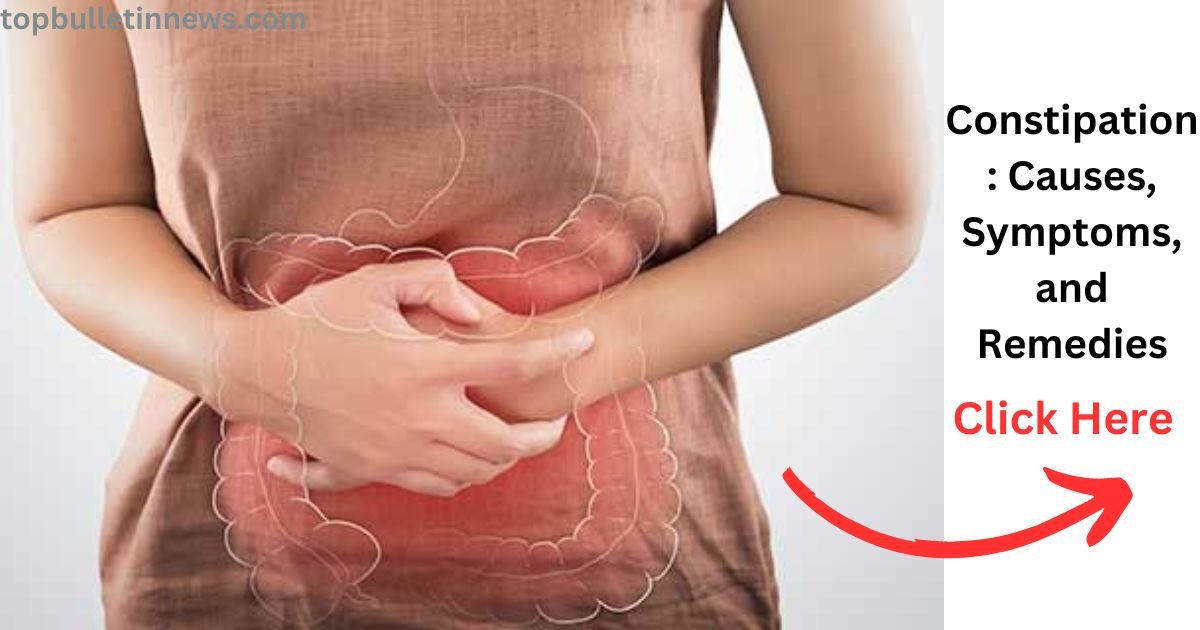Constipation, a prevalent digestive concern, affects individuals across various stages of life. It arises when bowel movements become less frequent or challenging to pass. While occasional bouts of constipation are typically benign, persistent or chronic constipation can profoundly affect an individual’s well-being and daily life. In this article, we’ll delve into the causes, symptoms, and remedies for constipation, providing insights to help you better understand and manage this condition.
Causes of Constipation
Constipation is a common digestive issue that affects people of all ages and backgrounds. While it may seem like a straightforward problem, the causes of constipation can be varied and complex. In this article, we’ll delve into the diverse factors that contribute to constipation, shedding light on this often misunderstood condition.
1. Dietary Factors
One of the primary culprits behind constipation is diet. A lack of fiber in the diet is a common cause, as fiber adds bulk to stool, making it easier to pass through the digestive tract. Conversely, diets high in processed foods and low in fruits, vegetables, and whole grains can contribute to constipation.
2. Dehydration
Inadequate hydration can also lead to constipation. When the body is dehydrated, it absorbs more water from the stool, resulting in harder, drier stools that are difficult to pass. It’s essential to drink plenty of fluids throughout the day to keep the digestive system functioning smoothly.
3. Sedentary Lifestyle
Physical activity is like a catalyst for maintaining optimal digestion. A sedentary lifestyle can slow down the movement of stool through the intestines, leading to constipation. Regular exercise helps stimulate bowel movements and promotes overall digestive health.
4. Medications
Some medications come with an unexpected side effect: constipation may hitch a ride along with the intended benefits. These may include painkillers, antidepressants, antacids containing calcium or aluminum, and certain blood pressure medications. If you suspect that your medication may be causing constipation, it’s essential to consult with your healthcare provider.
5. Ignoring the Urge to Defecate
Ignoring the urge to have a bowel movement can disrupt the natural rhythm of the digestive system and contribute to constipation. It’s essential to listen to your body’s signals and respond promptly when the urge arises.
6. Neurological Conditions
Neurological conditions such as Parkinson’s disease, multiple sclerosis, and spinal cord injuries can affect the nerves that control bowel function, leading to constipation. Managing these underlying conditions with appropriate medical care is essential for alleviating constipation symptoms.
7. Hormonal Changes
Hormonal changes, such as those occurring during pregnancy or menstruation, can influence bowel movements and contribute to constipation. Pregnant women, in particular, may experience constipation due to hormonal fluctuations and the pressure of the growing uterus on the intestines.
8. Aging
As we age, the muscles in the digestive tract may weaken, leading to slower bowel movements and an increased risk of constipation. Additionally, older adults may be more prone to constipation due to dietary changes, decreased physical activity, and certain medications commonly prescribed in later life.

Symptoms of Constipation
Constipation, though common, can cause discomfort and disrupt daily life. Recognizing its symptoms is the first step toward finding relief. In this article, we’ll explore the various signs that indicate constipation and discuss how to manage them effectively.
1. Infrequent Bowel Movements
One of the hallmark symptoms of constipation is infrequent bowel movements. While the frequency of bowel movements can vary from person to person, experiencing fewer than three bowel movements per week may indicate constipation.
2. Difficulty Passing Stool
Difficulty passing stool, characterized by straining or a feeling of incomplete evacuation, is another common symptom of constipation. Individuals may feel as though they need to strain excessively to pass stool, or they may experience a sensation of blockage in the rectum.
3. Hard or Dry Stool
Stool consistency is also a key indicator of constipation. Hard, dry, or lumpy stools that are difficult to pass are characteristic of constipation. Individuals may notice that their stools are smaller than usual and require increased effort to expel.
4. Abdominal Discomfort
Constipation can cause discomfort or pain in the abdomen. This may manifest as bloating, cramping, or a feeling of fullness. The discomfort may be localized to the lower abdomen or may radiate throughout the abdominal region.
5. Rectal Bleeding
In some cases, constipation can lead to rectal bleeding or the passage of bright red blood during bowel movements. This may occur due to the strain placed on the rectal veins during bowel movements or as a result of small tears in the anal tissue.
6. Sensation of Incomplete Evacuation
Individuals with constipation may experience a sensation of incomplete evacuation after bowel movements. They may feel as though they have not fully emptied their bowels or may continue to feel the urge to have a bowel movement even after attempting to pass stool.
7. Changes in Bowel Habits
Constipation can cause changes in bowel habits, including irregularity or a decrease in the frequency of bowel movements. Some individuals may experience alternating periods of constipation and diarrhea, known as mixed bowel habits.
8. Abdominal Distension
Severe or prolonged constipation can lead to abdominal distension, or a visibly swollen or enlarged abdomen. This may occur due to the accumulation of gas and stool in the intestines, leading to bloating and discomfort.
Managing Constipation Symptoms
While occasional constipation is often temporary and can be managed with lifestyle changes, chronic constipation may require medical intervention. Drinking plenty of water, increasing fiber intake, and engaging in regular physical activity can help alleviate constipation symptoms. Over-the-counter laxatives or stool softeners may also provide relief for short-term constipation. However, if constipation symptoms persist or are accompanied by severe pain, bleeding, or other concerning symptoms, it’s essential to seek medical advice for proper evaluation and treatment. By understanding the symptoms of constipation and addressing them promptly, individuals can improve their digestive health and overall well-being.

Constipation Treatment at Home
Constipation can be a discomforting and frustrating condition, but relief may be closer than you think. With a few simple adjustments to your lifestyle and habits, you can effectively manage constipation from the comfort of your own home. In this article, we’ll explore some tried-and-true home remedies for constipation that are both natural and effective.
1. Increase Fiber Intake
Think of fiber as the superhero swooping in to rescue your digestive system from constipation’s clutches. Incorporate plenty of fiber-rich foods into your diet, including fruits like apples, pears, and berries, as well as vegetables like broccoli, spinach, and carrots. Whole grains such as oats, brown rice, and whole wheat bread are also excellent sources of fiber. Aim for at least 25-30 grams of fiber per day to keep things moving smoothly.
2. Hydrate, Hydrate, Hydrate
Picture hydration as the lifeblood of your digestive system, ensuring smooth sailing and warding off the dry spells of constipation. Make sure to drink plenty of water throughout the day, aiming for at least 8-10 glasses. Herbal teas, such as peppermint or ginger tea, can also be soothing to the digestive system and help alleviate constipation.
3. Exercise Regularly
Physical activity is not only beneficial for your overall health but also plays a key role in promoting regular bowel movements. Shoot for the stars with a goal of engaging in moderate exercise for at least 30 minutes on the majority of days in your week. Activities like walking, jogging, cycling, or yoga can all help stimulate the muscles in your digestive tract and encourage bowel regularity.
4. Establish a Regular Bathroom Routine
Set aside time each day for a bowel movement, preferably after meals when your body’s natural reflexes are most active. Try to relax and avoid rushing, as stress and tension can contribute to constipation. Creating a calm and comfortable bathroom environment can also help promote regularity.
5. Natural Laxatives and Stool Softeners
Certain foods and beverages have natural laxative properties that can help alleviate constipation. Prunes and prune juice are well-known for their ability to stimulate bowel movements. Other natural remedies include flaxseeds, chia seeds, and aloe vera juice. However, it’s essential to use these remedies in moderation and consult with a healthcare professional if you have any underlying health conditions or concerns.
6. Probiotics for Gut Health
Probiotics are beneficial bacteria that promote a healthy balance of gut flora and can help improve digestion and regularity. Add a flavorful twist to your diet by sprinkling in probiotic-rich foods like yogurt, kefir, sauerkraut, and kimchi for a gut-friendly boost. You can also take probiotic supplements, but be sure to choose a high-quality product with strains specifically targeted for digestive health.
7. Listen to Your Body
Finally, pay attention to your body’s signals and respond accordingly. If you feel the urge to have a bowel movement, don’t ignore it. Holding in stool can lead to constipation and discomfort. Additionally, be mindful of any dietary triggers or habits that may contribute to constipation, such as excessive consumption of processed foods or insufficient water intake.
Click Here :- Hairfall In Monsoon
When to Seek Medical Attention
While occasional constipation can often be managed with lifestyle changes, persistent or severe constipation may require medical attention. Consult a healthcare provider if you experience:
- Persistent constipation despite making dietary and lifestyle changes.
- Severe abdominal pain or rectal bleeding.
- Unexplained weight loss.
- Changes in bowel habits accompanied by other symptoms such as fatigue or nausea.
In conclusion, constipation is a common digestive issue that can usually be managed with simple lifestyle changes. By understanding its causes, recognizing its symptoms, and implementing appropriate remedies, you can effectively alleviate constipation and improve your overall digestive health. However, if constipation persists or is accompanied by concerning symptoms, don’t hesitate to seek medical advice for proper evaluation and treatment.
Error: Contact form not found.









